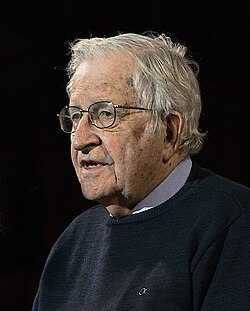Plato's problem

Plato's problem is the term given by Noam Chomsky to "the problem of explaining how we can know so much" given our limited experience.[1] Chomsky believes that Plato asked (using modern terms) how we should account for the rich, intrinsic, common structure of human cognition, when it seems underdetermined by extrinsic evidence presented to a person during human development.[2] In linguistics this is referred to as the "argument from poverty of the stimulus" (APS). Such arguments are common in the natural sciences, where a developing theory is always "underdetermined by evidence".[3] Chomsky's approach to Plato's problem involves treating cognition as a normal research topic in the natural sciences, so cognition can be studied to elucidate intertwined genetic, developmental, and biophysical factors.[4] Plato's problem is most clearly illustrated in the Meno dialogue, in which Socrates demonstrates that an uneducated boy nevertheless understands geometric principles.
References
[edit]- ^ Chomsky, Noam: Knowledge of Language, 1986, p. xxv
- ^ Noam Chomsky interview: Journal of Advanced Composition, Vol. 11, No. 1, 1991
- ^ Hornstein, Norbert -- Routledge Encyclopedia of Philosophy, London, 1998
- ^ Chomsky, Noam, 2004: Biolinguistics and the Human Capacity
Further reading
[edit]- Blake, Randolph, and Robert Sekuler. Perception. 5th ed. New York, NY: McGraw-Hill, 2006.
- Bruner, J. S., & Kenney, H. J. (1965). Representation and mathematics learning. In L. N. Morrisett and J. Vinsonhaler (Eds.), Mathematical learning. Monographs of the Society for Research in Child Development, 30 (Serial No. 99).
- Carnie, Andrew. Syntax. Oxford: Blackwell, 2002.
- Cherry, C. (1966). On human communication. (2nd ed.). Cambridge, MA: The MIT Press.
- Chomsky, Noam. Modular Approaches to the Study of the Mind. San Diego: San Diego State University Press, 1984.
- Dresher, Elan. Language and Mind Forum. 2000. Ahmanson Foundation. 15 Mar. 2006 <http://www.usc.edu/dept/LAS/linguistics/langmind.htm#dresher>
- Kemerling, Garth. A Dictionary of Philosophical Terms and Names. 2002. 11 Apr. 2006. <http://www.philosophypages.com/dy/index.htm>
- Mayer, Richard E. Thinking, Problem Solving, Cognition. 2nd ed. New York, NY: W. H. Freeman and Company, 1991.
- McGilvray, James, ed. The Cambridge Companion to Chomsky. Cambridge: Cambridge University Press, 2005.
- Meno:Introduction. 2004. Farlex, Inc. 15 Mar. 2006. <http://plato.thefreelibrary.com/Meno/1-1>
- Moray, N. (1959). Attention in dichotic listening: Affective cues and the influence of instructions. Quarterly Journal of Experimental Psychology, 11, 56–60.
- Nisbett, R. E., & Ross, L. (1980). Human preferences: Strategies and shortcomings of social judgment. Englewood Cliffs, NJ: Prentice-Hall.
- Plato: (427 B.C. – 347 B.C.). 2004. Farlex, Inc. 15 Mar. 2006. <http://plato.thefreelibrary.com>
- Pojman, Louis P. Classics of Philosophy. 2nd ed. Oxford: Oxford UP, 2003.
- Russell, Bertrand. The History of Western Philosophy. New York, NY: Simon and Schuster, 1945.
- Solso, Robert L., M. Kimberly MacLin, and Otto H. MacLin. Cognitive Psychology. 7th ed. Boston, MA: Allyn and Bacon, 2005.
- Tulving, E. (1993). "What is episodic memory?". Current Directions in Psychological Science. 2 (3): 67–70. doi:10.1111/1467-8721.ep10770899. S2CID 142992860.
External links
[edit]- Isac, Daniela; Charles Reiss (2008). I-language: An Introduction to Linguistics as Cognitive Science. Oxford University Press. ISBN 978-0-19-953420-3.
